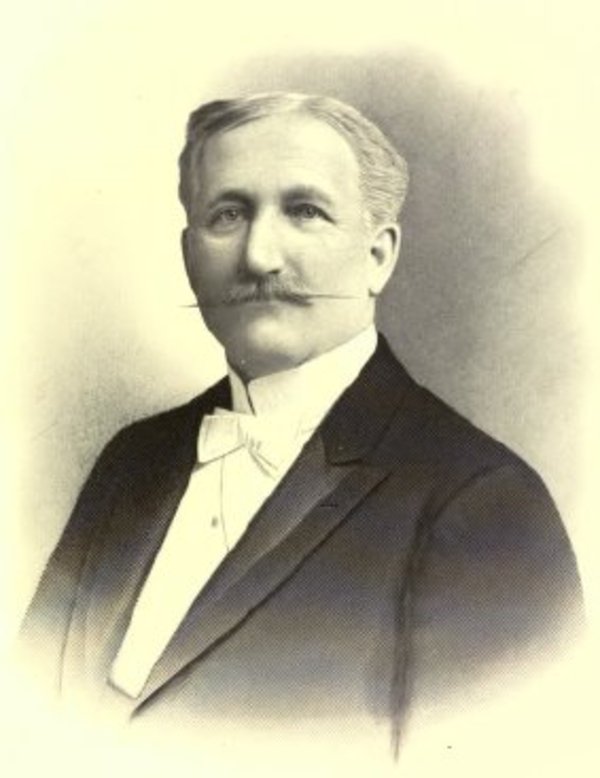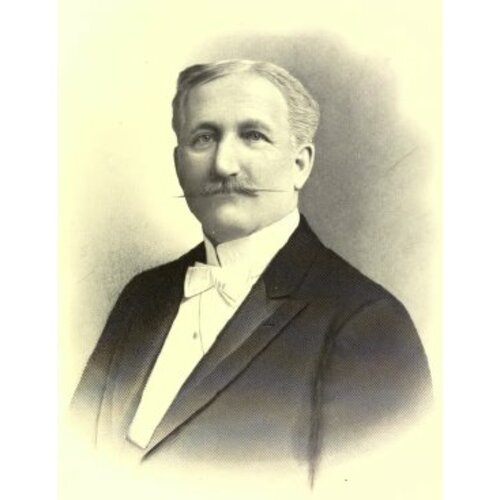As part of the funding agreement between the Dictionary of Canadian Biography and the Canadian Museum of History, we invite readers to take part in a short survey.

Source: Courtesy of Wikimedia Commons
JONES, Sir LYMAN MELVIN (he began using Melvin-Jones in the 1890s), businessman and politician; b. 21 Sept. 1843 in Whitchurch Township, Upper Canada, son of Norman Jones, a farmer, and Theresa Jane Patterson; m. first 21 Feb. 1866 Huldah Stephens of Tecumseth Township, Upper Canada; m. secondly 3 July 1872 Louise Irwin (d. 1920), and they had a daughter; d. 15 April 1917 in Toronto.
Of Welsh-Scottish ancestry, Lyman Melvin Jones left the rigours of farm life in 1868 to join his brother, David Allanson*, in a general store in Clarksville (Beeton), Ont. In 1873, partly to secure the physical benefits of employment outdoors, he joined an agricultural implements firm, A. Harris, Son and Company of Brantford [see John Harris*], as a traveller and repairman, and he later became a partner. After a railway was built linking Minnesota and Manitoba [see James Jerome Hill], he was sent to Winnipeg to set up a western branch, which opened in 1880.
With characteristic vigour, Jones thrust himself into both business and municipal life in Winnipeg. During the period 1882–86 the sales transacted through his office constituted about 40 per cent of the Canadian total of a much-impressed Harris company. Elected to Winnipeg City Council in 1886, he gained a reputation for his work on its finance committee. He was mayor in 1887–88 and vice-president of the Winnipeg Board of Trade in 1887. Although he relished municipal affairs, on 25 Jan. 1888 he readily accepted the post of provincial treasurer in the new Liberal government, where he became part of Premier Thomas Greenway*’s inner circle on railway matters. His presence did much to soothe a business community anxious for representation. First elected in March 1888 in a by-election for Shoal Lake, he was returned in the general election of July for North Winnipeg.
Jones’s appointment in 1888 as general manager of the Harris firm led to his resignation from cabinet in May 1889 and his return to Brantford, although he would retain his seat until 1892. Various authorities credit him with the perfection of Harris’s open-end binder, which strengthened the firm’s position in its intense rivalry with the Massey Manufacturing Company. Following the merger of the two companies in 1891 Jones emerged as general manager of Massey-Harris Company, based in Toronto. He abided uneasily the presidency of Hart Almerrin Massey*, who died in 1896, but under Massey’s less authoritarian sons Walter Edward Hart* and Chester Daniel his ambitions gained momentum. With little talent for delegation but highly regarded as an “implements man,” he would become increasingly involved in the company’s European trade, pushing aside some Massey veterans.
After the federal Liberal government of Wilfrid Laurier, elected in 1896, started edging towards reduction of tariffs, Jones, alarmed by the prospect of a greater American competition, launched a blustery correspondence with Laurier and Clifford Sifton*, a Manitoba mp and minister of the interior. At the same time, claiming that he had made Massey-Harris over as a Liberal company and had secured much foreign business for Canada, he began lobbying for a senatorship. “I want it,” he demanded of Sifton in 1900 and the following year he got it, likely as mollification.
In March 1903, after Chester Massey stepped down, Jones was elected president of Massey-Harris as well as general manager. Over the next 11 years he would face growing American penetration of the Canadian market, the periodic rise and fall of his personal finances, and the disconcerting possibility of reciprocity. Jones moved Massey-Harris slowly forward in its development of a full line of implements, including gasoline engines, but, perhaps for reasons of cost and markets, he was seemingly indifferent to the revolutionary gasoline-powered tractor. He devoted particular attention to the aggressive expansion of the firm’s western Canadian network of branches and to securing steady supplies of steel. (He was a director of one major supplier, the Nova Scotia Steel and Coal Company Limited.) Massey-Harris’s purchase in 1910 of the Johnston Harvester Company in Batavia, N.Y., was seen as a venture into the American market, but Jones had no serious thoughts of competing there. Of greater practical value was the company’s malleable-iron plant.
Although, like most Canadian manufacturers, Jones worried about reciprocity, he was absent from the key groups of discontented Liberals and eastern businessmen who opposed the international agreement tabled in January 1911. Attempting to balance his protectionist feeling with party loyalty, he muted his concern, knowing anyway that few of the proposed duties on implements involved reductions. His efforts in western journals to deflect criticism from Massey-Harris, by explaining that it set low prices and made little profit in the west, were readily countered. As much as he understood agriculture on the prairies, he only narrowly comprehended free-trade/ anti-credit sentiment there. In the election of 1911, which the Conservatives won, he worked for the Liberal interests in Brantford, the west, and wherever he could lean on company personnel. That same year the Laurier government had successfully recommended Jones, an avowed imperialist, for a knighthood, evidently because of his donation towards the nationalization of the Plains of Abraham at Quebec. In 1914, the year he finally broke with the Liberal party over its trade policy, he received the French Legion of Honour, another plum that he had coveted.
Following the outbreak of World War I, Massey-Harris’s production and European sales fell dramatically. A shell department was opened in 1914 and in Britain the firm established Kingswood, a convalescent home for Canadian soldiers at Dulwich (London). The home was carefully publicized to convey the wartime image that Jones, a vice-president of the Canadian Patriotic Fund, wanted to attach to Massey-Harris. He himself did not survive to restore the firm to its full pre-war state.
Bridled by an autocratic style of management moulded in the 19th century, Jones’s efforts to move Massey-Harris solidly into the 20th fell short of his ambitions. A large, egotistical man with a waxed moustache (he had begun hyphenating his name in the 1890s), he was a keen club-man, a member of St Andrew’s Presbyterian Church, and a convivial raconteur and host at his Toronto residence, Llawhaden. In the Senate he moralized about corporate “consciences,” but in the boardroom he bluntly rejected any responsibility for the indebtedness of western farmers and in Toronto he wasted little energy on management-labour relations. His political correspondence conveys a sense more of self-interest and toadyism than of partisan sagacity; he was easily handled by Laurier. Jones was overrated by eastern Canadian contemporaries, who saw him as “an extraordinarily strong personality” possessed of an unerring sense in business. In truth, his character did much to limit his achievements.
AO, RG 22-305, no.33693; RG 80-27-2, 63: 244. Man., Legislative Library (Winnipeg), Biog. scrapbooks, B5: 192; B6: 203. NA, MG 26, G; MG 27, II, D15; MG 32, A1. Ontario Agricultural Museum (Milton), Massey-Ferguson Arch. PAM, GR 1662; MG 12, E. Varity Corporation (Buffalo, N.Y.), Massey-Harris Company Limited, board of directors, minutes, 1902–3. Beeton World (Beeton, Ont.), 19 April 1917. Manitoba Free Press, 1886–89, 16 April 1917. World (Toronto), 16, 19 April 1917. CPG, 1889–92. Merrill Denison, Harvest triumphant: the story of Massey-Harris, a footnote to Canadian history (Toronto, 1948). W. G. Phillips, The agricultural implement industry in Canada; a study of competition (Toronto, 1956). Standard dict. of Canadian biog. (Roberts and Tunnell).
Cite This Article
David Roberts, “JONES (Melvin-Jones), Sir LYMAN MELVIN,” in Dictionary of Canadian Biography, vol. 14, University of Toronto/Université Laval, 2003–, accessed March 29, 2025, https://www.biographi.ca/en/bio/jones_lyman_melvin_14E.html.
The citation above shows the format for footnotes and endnotes according to the Chicago manual of style (16th edition). Information to be used in other citation formats:
| Permalink: | https://www.biographi.ca/en/bio/jones_lyman_melvin_14E.html |
| Author of Article: | David Roberts |
| Title of Article: | JONES (Melvin-Jones), Sir LYMAN MELVIN |
| Publication Name: | Dictionary of Canadian Biography, vol. 14 |
| Publisher: | University of Toronto/Université Laval |
| Year of revision: | 1998 |
| Access Date: | March 29, 2025 |



